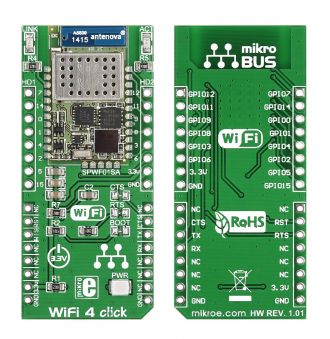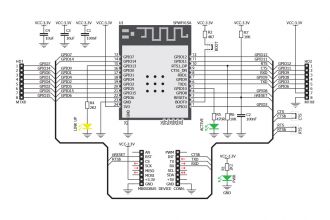
We strongly encourage users to use Package manager for sharing their code on Libstock website, because it boosts your efficiency and leaves the end user with no room for error. [more info]

Rating:
Author: MIKROE
Last Updated: 2016-02-25
Package Version: 1.0.0.0
Example: 1.0.0.0
Category: WIFI
Downloaded: 1394 times
Not followed.
License: MIT license
The WiFI4 click board carries SPWF01SA intelligent Wi-Fi modules represent a plug and play and standalone 802.11 b/g/n solution for easy integration of wireless Internet connectivity
The example demonstrates web server application - it reads button inputs from the development board and toggles LEDs from the web page .
Do you want to subscribe in order to receive notifications regarding "WiFi4 click - Example" changes.
Do you want to unsubscribe in order to stop receiving notifications regarding "WiFi4 click - Example" changes.
Do you want to report abuse regarding "WiFi4 click - Example".
| DOWNLOAD LINK | RELATED COMPILER | CONTAINS |
|---|---|---|
| 1438958218_wifi4_click___ex_mikroc_arm.rar [61.38KB] | mikroC PRO for ARM |
|

Front and back view of WiFi4 click board designed in mikroBUS form factor. mikroBUS is specially designed pinout standard with SPI, I2C, Analog, UART, Interrupt, PWM, Reset and Power supply pins.
View full imageWiFi 4 click carries SPWF01SA, a complete standalone WiFi module with a single-chip 802.11 b/g/n transceiver, a 32-bit STM32 MCU, along with a built-in 2.4 GHz ISM band antenna. The onboard module has 1.5 MB of internal flash and 64 KB of RAM, plus a fully integrated TCP/IP protocol stack with added web server and application service capabilities. WiFi4 click communicates with the target MCU through the mikroBUS™ UART interface, but the board also features additional 14 GPIO pins. Uses a 3.3V power supply only.
Examples are written for :
EasyMx PRO for STM32 - STM32F107VC
